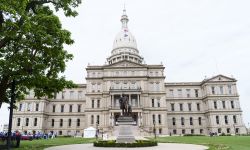Whitmer: Michigan can take lead in electric vehicle highway, job training

Sept. 29: Michigan wants to lead U.S. in electric vehicles. Ford turned elsewhere.
MACKINAC ISLAND — Gov. Gretchen Whitmer announced plans Wednesday to bolster Michigan’s electric vehicle charging infrastructure and train more workers for jobs in the industry.
The plans, unveiled at the Detroit Regional Chamber’s Mackinac Policy Conference, come as Michigan seeks to seize upon the electric vehicle revolution to maintain jobs that otherwise would be threatened by the demise of the internal combustion engine.
Related:
- Michigan $70B budget deal hailed for ‘historic investment’ in child care
- $20 million housing fund may help Wayne County settle Afghan refugees
- Michigan Republicans sue over Gov. Whitmer fundraising loophole
State leaders are working with an initial $1.25 million to provide grants to install publicly-accessible charging stations along the state’s Lake Michigan shoreline, and they hope to attract private sector funding for the effort too, said Trevor Pawl, chief mobility officer at the Office of Future Mobility and Electrification within the Michigan Economic Development Corp.
The state also plans to spend up to $5 million to start an employer-led training program to build a workforce capable of filling jobs in the globally competitive vehicle electrification industry.
Nationally, adoption of autonomous vehicles could result in up to 2.6 million lost jobs nationally by 2051, the state says.
Yet at the same time, Michigan’s mobility industry’s total gross economic output was $304 billion in 2019, representing 28 percent of the state’s gross economic output, according to MichAuto, an initiative of the Detroit Regional Chamber.
At the same time, Michigan is falling behind other states, ranking 32nd nationally for charging infrastructure per capita, according to the report.
The plans released on Wednesday are “as much about industry as it is about infrastructure, because how it all works together makes our state better, but there's some urgency here,” Whitmer said.
“We're in the midst of a seismic transition in Michigan, as we move forward the clean energy transportation future,” she continued. “We have to ensure that businesses and our workforce are ready to lead this transition.”
Linking the plan to Michigan’s economic future and its love for “the Great American road trip,” Whitmer outlined a vision for a near future where it’s possible to drive the length of the state’s Lake Michigan shoreline without experiencing the “range anxiety” that comes with driving electric vehicles in areas where charging stations are few and far between.
“Imagine those same trips without having to pay a single cent for gas,” she said, casting the charging circuit as a lure for out-of-state visitors from places like Chicago and Milwaukee.
The circumference of the Lake Michigan shoreline is 1,640 miles, and the average electric vehicle can travel 150 to 300 miles before it needs a charge, though battery technology is improving to lengthen the distance cars can travel between charges.
Whitmer did not announce deeper funding specifics on Wednesday, but Pawl said the plan to build a network of charging stations along Lake Michigan is meant to make the state an attractive candidate for funding from the $1 trillion federal infrastructure bill that is awaiting approval in Congress.
The infrastructure bill is expected to funnel large sums into states to help them build out infrastructure needed to get the country off of fossil fuels.
Electric vehicles comprised about 2 percent of auto sales in the United States in 2020, but President Joe Biden has set a goal that half of new cars sold will be electric by 2030, with money in his version of the infrastructure plan earmarked for that effort.
The Lake Michigan charging network plan is still in its early stages and administration officials did not offer a timeline for when more electric vehicle chargers would begin to crop up along the shoreline.
Whitmer said state leaders are recruiting the other Lake Michigan states — Indiana, Illinois and Wisconsin — in hopes of creating a complete electric vehicle-friendly loop around the lake.
Pawl said the plan for the so-called “Lake Michigan EV Circuit” fits into a broader effort to create “America’s best network of charging stations” in Michigan.
It comes a day after Whitmer announced at Motor Bella in Pontiac an effort to develop the nation’s first wireless charging infrastructure along a one-mile stretch of a state road somewhere in southeast Michigan.
Meanwhile, the new education effort, called The Michigan Revolution for Electrification of Vehicles Academy/Academies, is important because Michigan stands to lose tens of thousands of jobs as automotive companies switch to electric vehicle production, said Jeff Donofrio, CEO of Business Leaders for Michigan.
Donofrio said the state has 46,000 jobs that are directly related to the production of internal combustion engine drivetrain, with a total of 170,000 jobs supported by traditional gasoline-powered engines.
“So how do we make sure that these workers … are able to make the transition?” Donofrio said. “Because we know that in 10 years our own (Michigan-based auto) companies are talking about 30 to 40 percent of their new vehicle sales being electrified.”
The initiative, according to the state’s request for proposals, “will facilitate pre-hire and post-hire education and training in technologies supporting the automotive mobility and electrification industry.”
Proposals are due Nov. 8, from up to five entities that will plan a workforce pipeline for electric vehicle production. Michigan employers already are struggling to meet the demand for skilled professionals in mobility and auto electrification, the state said.
“We have to train people for the jobs that are going to be there and they have to understand exactly what is necessary to be competitive,” Donofrio said.
Business Watch
Covering the intersection of business and policy, and informing Michigan employers and workers on the long road back from coronavirus.
- About Business Watch
- Subscribe
- Share tips and questions with Bridge Business Editor Paula Gardner
Thanks to our Business Watch sponsors.
Support Bridge's nonprofit civic journalism. Donate today.
See what new members are saying about why they donated to Bridge Michigan:
- “In order for this information to be accurate and unbiased it must be underwritten by its readers, not by special interests.” - Larry S.
- “Not many other media sources report on the topics Bridge does.” - Susan B.
- “Your journalism is outstanding and rare these days.” - Mark S.
If you want to ensure the future of nonpartisan, nonprofit Michigan journalism, please become a member today. You, too, will be asked why you donated and maybe we'll feature your quote next time!




